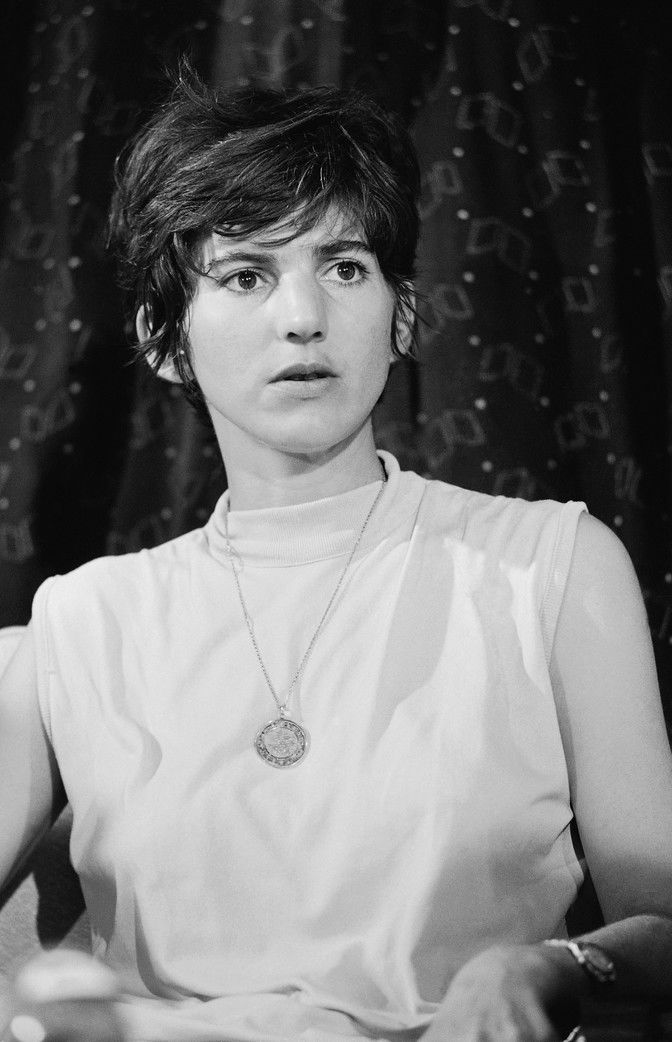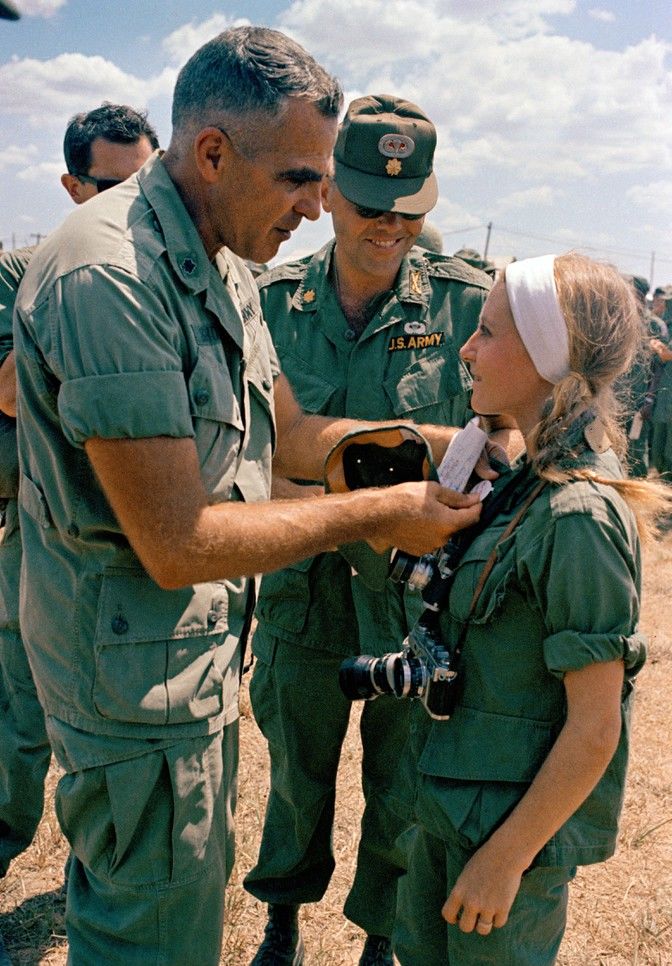
The Women Who Changed War Reporting
In 1966, a young American journalist named Frances FitzGerald began publishing articles from South Vietnam in leading magazines, including this one. She was the unlikeliest of war correspondents—born into immense privilege, a daughter of the high-WASP ascendancy.
Her father, Desmond FitzGerald, was a top CIA official; her mother, Marietta Tree, a socialite and liberal activist. FitzGerald was raised with servants and horses, and she had to fend off advances from the likes of Adlai Stevenson (her mother’s lover) and Henry Kissinger.
Her family contacts got her through the door of feature journalism in New York, but as a woman, she was denied the chance to pursue the serious work she wanted to do. She escaped this jeweled trap by making her own way to Saigon at age 25, just as the American war was escalating.
The Vietnam War had already produced some of the greatest journalism of the century and made the reputations of young reporters such as David Halberstam, Neil Sheehan (who died earlier this year), and Malcolm Browne.
All of them were men. All focused their reporting on the fighting, and on the lies and failures of American officialdom. FitzGerald pursued a different story. Sheltered all her life, she was profoundly shocked by the suffering of the Vietnamese—not just the death, injury, and displacement, but the loss of identity under the crushing weight of the Americans.
Rather than competing with her male colleagues, she spent time in hospitals, villages, and slums, and she became engrossed in the politics of Buddhist students, the tragedies of refugees, the strategy of the Viet Cong, the history and culture of Vietnam.
It took a 20-something Radcliffe graduate with an appetite for French anthropology and immersive reporting to bring home the bad news that no officials and few journalists were telling Americans: The war was hopeless because the United States, ignorant of Vietnam, had taken over the colonialist role of the French.
“She was looking at things in a completely different optic, like she was from a different country—a whole new meaning to the phrase foreign correspondent,” Ward Just, The Washington Post’s correspondent in Vietnam and FitzGerald’s sometime lover, tells the journalist Elizabeth Becker in her new book, You Don’t Belong Here: How Three Women Rewrote the Story of War. FitzGerald used her “different optic” and formidable intellect to pursue investigations that culminated in Fire in the Lake, published in 1972, one of the most important and decorated books of the war.
You Don’t Belong Here tells the story of FitzGerald and two other women in Vietnam—the French photographer Catherine Leroy and the Australian correspondent Kate Webb. Becker is a former correspondent in Cambodia and the author of When the War Was Over; she was the first journalist to interview Pol Pot, and barely escaped the Khmer Rouge alive.
Her theme in You Don’t Belong Here—conveyed, with controlled anger, in a riveting narrative using unpublished letters and diaries—is that women reporters changed the way the war was covered. Before Vietnam, they had been barred from combat by the U.S. government (which didn’t stop a few legendary writers from slipping past the barriers, such as Martha Gellhorn in World War II). Vietnam was an undeclared war, so the rules were never clear.
Women journalists were still subjected to discrimination, harassment, and contempt, but they didn’t have to ask permission in order to go where the men went, and often where the men didn’t go. Vietnam became the first war in which women had a fighting chance as reporters. The difficulty of gaining acceptance forced them to find their own way, which led to groundbreaking work.
Leroy was utterly without experience on arrival in Vietnam. She was diminutive and brave to the point of recklessness, and she won respect by outdoing the men. She accompanied the marines into battle and made herself so inconspicuous that her camera caught the face of combat with unprecedented intimacy and pathos: “Few photographers got closer to soldiers than Leroy, who crawled in the mud alongside them if necessary, aiming for the eyes and subtle shifts of expression. She was a silent presence; soldiers were rarely aware of her.” When she showed her close-ups to a medic who had cradled the body of a marine during the battle of Hill 881 at Khe Sanh, he exclaimed, “Where were you? I didn’t see you.”
 Kate Webb, a UPI correspondent in Cambodia, is shown after her release from captivity in May 1971.
Kate Webb, a UPI correspondent in Cambodia, is shown after her release from captivity in May 1971.
Leroy was a type familiar to anyone who has covered war in our era. Women correspondents are now commonplace, but they still have to overcome powerful stereotypes, and for some, the only way to be seen as legitimate is by being tougher than their male colleagues. Leroy forced her way onto helicopters and then made herself invisible. Kate Webb’s tactic was to defeminize herself.
Whereas FitzGerald went to Vietnam to get away from a controlling society mother and to impress an absent father, and Leroy rebelled against her petit bourgeois French Catholic upbringing, Webb was in flight from a very dark past.
The daughter of intellectual New Zealanders, raised in Australia, she was implicated in the suicide of her best friend in high school and nearly tried for homicide. A few years later, her parents were killed in a car accident. Like FitzGerald and Leroy, Webb went to Vietnam in her mid-20s without any assignment or relevant experience, out of sheer curiosity and will.
In Saigon, she cut her hair short, bought her own combat gear, and convinced UPI to give her a chance. She worked harder than anyone and, like FitzGerald, grabbed a beat that men had left more or less uncovered: South Vietnam’s military and government.
She refused any notion of being different from male colleagues, including the condescending compliments. “Webb hated being called a girl reporter; she felt it was a way to dismiss her accomplishments,” Becker writes. “Whenever she was asked, Webb replied: ‘I don’t believe in women’s liberation.’”
Some journalists are lucky enough to find a subject that takes over their life. No story is more consuming than war. Webb stayed on in Southeast Asia for almost a decade, covering the war’s spread to Cambodia, and being kidnapped by enemy troops twice, before the power imbalance in journalism finally caught up with her.
She quit after her boss in Hong Kong, his advances rebuffed, planted a negative report about her work at higher headquarters. (Webb resumed her career fitfully through the rest of the century.) Leroy never found another subject that came close to equaling Vietnam. She and Webb both died of cancer in their 60s, relatively obscure. FitzGerald went on to write many other books in a prominent career, but the obsession of Vietnam has never left her.
There is no gender difference here—a lot of male reporters have been captured by a war, none more tenacious than Vietnam—but Becker conveys the particular sacrifices that these three women had to make: the indignities, the psychological cost, the elusiveness of stable relationships and children. Still, it’s exhilarating to read Becker’s account of how these women overcame the narrow definitions of their early lives and found themselves by surrendering to the extreme demands of reporting a war.
 French photojournalist Catherine Leroy receives a pin from Col. Bob
Siegholz, left, commemorating her parachute jump with the 173rd Airborne
Brigade in Operation Junction City during the Vietnam War, in 1967.
Leroy, the only woman to jump with the paratroopers, received a pin with
the battalion's slogan, "We Try Harder."
French photojournalist Catherine Leroy receives a pin from Col. Bob
Siegholz, left, commemorating her parachute jump with the 173rd Airborne
Brigade in Operation Junction City during the Vietnam War, in 1967.
Leroy, the only woman to jump with the paratroopers, received a pin with
the battalion's slogan, "We Try Harder."
They took advantage of an avid demand for war news on the home front to go deep into the world of the Vietnamese and give American readers an education they might not have known they wanted. The post–September 11 wars created a similar opening. Iraq and Afghanistan produced a golden age of foreign reporting and narrative nonfiction books.
So many remarkable journalists filed from the field—Lynsey Addario, Deborah Amos, Pamela Constable, Carlotta Gall, Anne Garrels, Jane Perlez, Alissa Rubin, Liz Sly, and Sabrina Tavernise among them—that the fact that they were women was no longer remarkable. Margaret Coker, formerly of The Wall Street Journal and The New York Times, continued to cover Iraq after most of the American press corps had moved on; she has produced a gripping new book about the shadow war between Iraqi intelligence officers and the Islamic State, The Spymaster of Baghdad: A True Story of Bravery, Family, and Patriotism in the Battle against ISIS.
Coker shares one crucial trait with FitzGerald—a guiding interest in the people who live where Americans are at war. Her subject is an elite Iraqi espionage unit called “the Falcons,” composed of ordinary men who helped save their country from the onslaught of ISIS. Coker’s reporting on these men, their families, and the family of a young woman recruited by terrorists is so meticulous that it lets her enter invisibly a closed, sometimes frightening world and portray it with cinematic detail. This is a tale of Iraqi heroism and sorrow, with no Americans in sight.
Interesting Americans in foreign countries is never easy; usually, it requires an American war. We Americans are on one of our long solipsistic runs. During the Trump years, foreign news almost seemed to disappear. Networks and newspapers have closed down international bureaus; magazines publish fewer features about other countries than they did 10 years ago.
At the same time, the practice of (mostly white) American reporters venturing into other (mostly nonwhite) people’s countries has fallen under ideological suspicion. There’s every reason to want foreign reporters to tell the stories of their own countries; there’s less reason to think that their work would break through the chronic indifference of an American audience with which they’re unfamiliar. The future of foreign reporting is as iffy as that of any field of journalism.
Women no longer face the barriers that confronted Becker’s Vietnam reporters, but they are still less likely than men to gain easy admittance to the insular world of U.S. military officers and national-security officials. So perhaps it makes sense that the most thoroughly Iraqi book of the war by an American journalist has been written by a woman.
Getting a book like The Spymaster of Baghdad into readers’ hands at this stage of the post–September 11 conflicts is an uphill battle. But as Iraq begins to be rebuilt by its people, there is real value in revisiting the country through an all-Iraqi narrative.
The Spymaster of Baghdad achieves through an excellent yarn what Fire in the Lake achieved through the epic synthesis of history, politics, and culture. Coker’s Iraq, like FitzGerald’s Vietnam, emerges as its own country, more impressive than the stage of an American drama that absorbed us for a few years, more real than the projection of American fantasies and traumas, returning to its own people, finding its own destiny.











